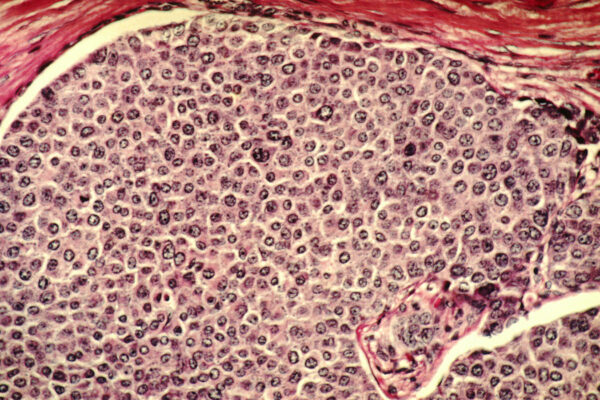
The most common type of breast cancer now has a new targeted treatment: an AstraZeneca drug that’s first in a new class of therapies addressing a certain genetic signature. But the new approval is narrower than expected, which limits the total addressable market for the therapy.
The FDA approved the new drug, capivastertib, for use in combination with fulvestrant, an older AstraZeneca breast cancer therapy. The new drug will be marketed under the brand name Truqap.

Health Executives on Digital Transformation in Healthcare
Hear executives from Quantum Health, Surescripts, EY, Clinical Architecture and Personify Health share their views on digital transformation in healthcare.
Approval of Truqap covers the treatment of adults with advanced cases of breast cancer classified as HR positive and HER2 negative. Those patients must also have disease that has either progressed after treatment with a hormone therapy or has come back after adjuvant therapy. Truqap joins a group of therapies already available for HR positive, HER2 negative breast cancer, including products from AstraZeneca. Truqap stands apart from them as the first AKT inhibitor.
AKT enzymes are key components of a signaling pathway that drives cell growth and proliferation in cancer. The FDA approved Truqap for treating patients whose HR positive, HER2 negative breast cancer has genetic alterations to AKT1 or two other associated enzymes, PIK3CA and PTEN. The genetic signatures will be detected by a Foundation Medicine companion diagnostic also approved by the FDA.
Of the 708 patients enrolled in Truqap’s placebo-controlled pivotal clinical trial, 289 had tumors with PIK3CA/AKT1/PTEN alterations. Patients were randomly assigned to receive the study drug and fulvestrant or a placebo and fulvestrant. The main goal was to measure progression-free survival, which is the time from randomization in the study until disease progression or death. Results showed a statistically significant difference in progression-free survival in both the overall study population as well as in those patients with the genetic alterations addressed by the AstraZeneca drug. Despite achieving that goal, the FDA limited Truqap’s approval only to those who have the key genetic signatures.
In a note sent to investors Friday, Leerink Partners analyst Andrew Berens wrote that the more limited population covered in the label may suggest a change in FDA sentiment “that requires the sponsor to have the burden of demonstrating prospectively and conclusively that all patients derive a benefit in order to be granted a broad label.”

Heard at HLTH 2024: Insights from Innovative Healthcare Executives
Executives from Imagine360, Verily, BrightInsight, Lantern, and Rhapsody shared their approaches to reducing healthcare costs and facilitating digital transformation.
Berens noted that at the Aug. 15, 2022 cut-off date, the study drug and fulvestrant showed a trend in overall survival benefit in the overall population and in the AKT pathway-altered population. But at that time, the overall survival data were not mature. Due to the smaller addressable market for Truqap, Leerink has slashed its peak sales estimate for the drug from $2.36 billion to $1.28 billion.
The most common grade 3 adverse reactions reported in the clinical testing were rash and diarrhea. Truqap is a pill taken twice daily for four days, followed by three days off in a 28-day treatment cycle. The cycle continues until disease progresses or drug toxicity becomes unacceptable.
“As a first-in-class medicine, this approval provides a critical new option for patients in the U.S. with this specific type of disease and we look forward to bringing Truqap to the many breast cancer patients who can benefit across the globe,” Dave Frederickson, executive vice president, Oncology Business Unit, AstraZeneca, said in a prepared statement.
FDA review of Truqap was done under Project Orbis, which permits concurrent submission and regulatory review of cancer drugs among participating countries. Through Project Orbis, Truqap is also currently under review in Australia, Brazil, Canada, Israel, Singapore, Switzerland, and the United Kingdom. Additional reviews are ongoing in China, the European Union, and Japan.
Public domain image by the National Cancer Institute








